The Checker Maven
The World's Most Widely Read Checkers and Draughts Publication
Bob Newell, Editor-in-Chief
Published every Saturday morning in Honolulu, Hawai`i
Noticing missing images? An explanation is here.
Vesuvius

Italy's Mount Vesuvius, an active volcano, has a storied history; the painting above illustrates its eruption in the year 79 C.E., a catastrophic event that obliterated the Roman cities of Pompeii and Herculaneum. The painting is by Jacob Philipp Hackert and dates to 1845; in 2009, it sold at auction for a rather steep 138,000 Euros.
Now, in checkers, there is the famous (or maybe not so famous) Vesuvius Shot, which "buries" 14 pieces from both White (Pompeii, if you wish) and Black (Herculaneum). But there's something else that's buried here. Checker enthusiast Manon Pruitt, of Nashville, North Carolina, used the Kingsrow ML computer engine to help dig it out, and we extended the analysis to find something deeper still. The starting position comes from play in Wood's Checker Studies.
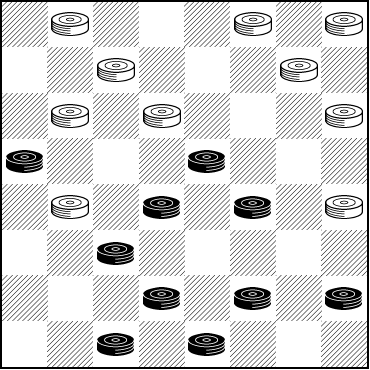
BLACK
Black to Move and Win?
B:W13,16,21,23,24,25,27,29,30,32:B2,3,5,6,7,11,14,15,18,20.
The following continuation is given in the original publication:
| 1. | 15-19 | 24-8 |
| 2. | 3-26 | 30-23 |
| 3. | 20-24 | 27-20 |
| 4. | 18-27 | 32-23 |
| 5. | 14-17 | 21-14 |
| 6. | 6-9 | 13-6 |
| 7. | 2-27 | 25-22 |
At this point Mr. Pruitt found, using KingsRow, that 25-21 instead of 25-22 would draw, thus overturning the problem conditions. But we investigated further and determined that in fact the published move, 25-22, also draws! There is a flaw in the ensuing published play. Here's position after 25-22.
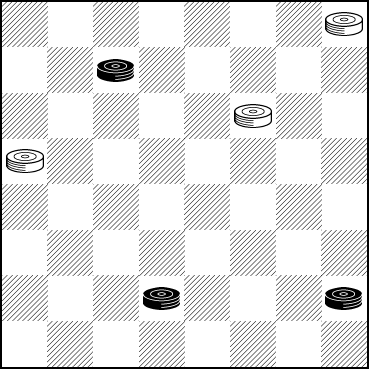
BLACK
Black to Play, White to Draw
B:W20,22,29:B5,7,27.
| 8. | 27-31 | 22-18 |
| 9. | 7-10 | 20-27 |
| 10. | 31-27 | 25-21 |
| 11. | ... | 10-14 |
Black would now win if the above play were correct, but it's not. Your challenge is to correct it.
Don't explode or erupt. Stay calm, and you'll find the solution, after which you can let your mouse vent on Read More to see the answers.![]()
The First Move

It's clear in the picture above that those two are attracted to each other, but they are equally clearly agonizing over who should make the first move.
In a checker problem, the first move is often critical, too.
We've written before about the excellent practice site Checker Cruncher, and we do stop by there every so often to try our luck on the site's large collection of interactive checker problems. We highly recommend it.
Site creator Brooks Thomas kindly gave us permission to republish Checker Cruncher problems that we find interesting, and the one below got our attention.
Naturally, it's all about that first move. There's only one move to win; everything else will draw or even lose.
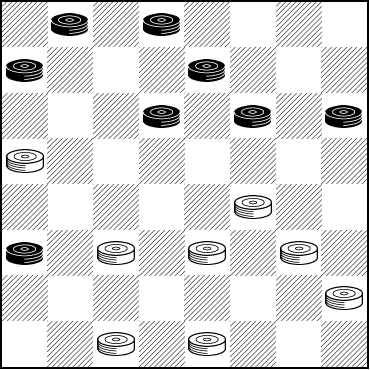
WHITE
White to Play and Win
W:W13,19,22,23,24,28,30,31:B1,2,5,10,7,11,12,21.
Can you make the first move by finding the first move? Solve the problem, and then make your next move clicking on Read More to check your answers.![]()
Miles To Go

In his poem Stopping by Woods on a Snowy Evening the immortal American poet, Robert Frost, wrote these equally immortal words:
The woods are lovely, dark and deep,
But I have promises to keep,
And miles to go before I sleep,
And miles to go before I sleep.
Today's Checker School "Gem" problem is by the somewhat less immortal checkerist Miles R. Smith. It's really quite nice, and we wish history had preserved more about Mr. Smith.
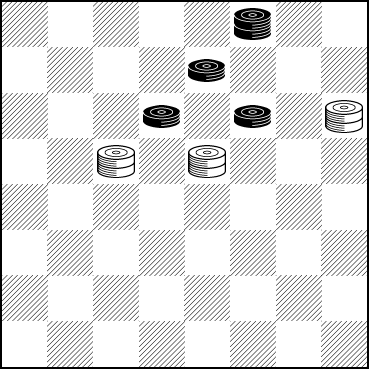
BLACK
Black to Play and Win
B:WK18,K19,K21:B22,23,26,K30.
Black is a piece up, but looks to be in a precarious situation; he can't avoid giving the piece back, hoping for a draw ... or is there another way? Can Black manage to still win this one? Miles to go before Black sleeps ...
See how far you travel in solving this one, then move your mouse inches ... not miles ... to click on Read More to see the solution.![]()
Super Easy

Looks good, doesn't it? It's "Super Easy Pot Roast" from someone who calls herself Chef Savvy and, checking over the recipe, it indeed looks like a great dinner made with minimal effort.
Is there such a thing as a great checker problem, solved with minimal effort? The most pleasing problems seem to be on the more difficult side, but there's another way to look at this: a simple problem solved very quickly can also provide a good measure of satisfaction.
To this end, we've decided to bring back our Javascript clock for perhaps just one time, as today's speed problem is in the category of "super-easy," and we don't want to spoil things by putting the problem diagram in-line. So you'll need to click below and then you'll have five seconds to beat the clock! No worries, that's definitely enough time.
Are you ready? Black to play and win ... and when you're done, come back and click Read More to check your answer.
March 2019 Speed Problem (Super easy)
![]()
The Stumper
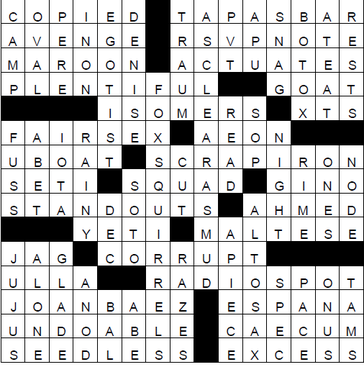
In the world of American crossword puzzles, each week renowned cruciverbalist Stanley Newman publishes the "Saturday Stumper." It's a very hard puzzle, often substantially harder than the one in the Saturday New York Times, which is in itself a real challenge.
Checker problemist Brian Hinkle has come up with a "stumper" of his own, and has kindly shared it with us. Let's have a look.
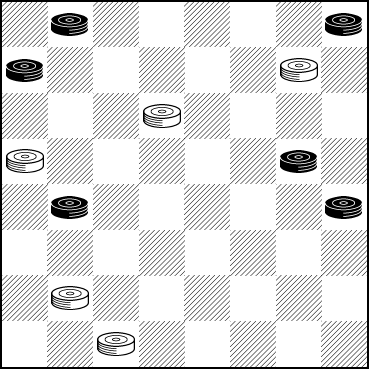
WHITE
White to Play and Draw 2 Ways
W:W8,10,13,25,30:B1,4,5,16,17.
As is typical with Brian's compositions, finding the first move is the real key, although even then you've still got to demonstrate the draw. But "Stumper" actually has two solutions. You may not necessarily be stumped in finding the first solution, but finding the second solution is truly a "Saturday Stumper" of our own.
Will you be stumped, not just on Saturday but in the ensuing days? Consider yourself a good solver if you find the first solution, and an amazing one if you find the second. Clicking on Read More, of course, will show you everything.![]()
Dang Tough

Tough steak? Bit off more than she can chew? The steak might possibly have been a little less tough, and more appealing, if it was tenderized and ... cooked.
Tough in checkers, of course, means something different (and so does "cooked" but that's a story for another day). It seems like we've published quite a number of tough problems lately, but hopefully they've been interesting and instructive. With that out of the way, we're going to publish one more. It's a good one, and although we've lost track of the source, it's nonetheless pleasing--- and tough.
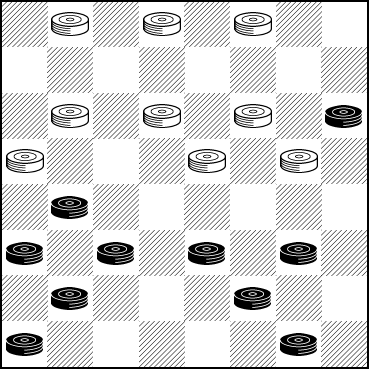
BLACK
Black to Play and Win
B:W17,18,20,22,23,24,30,31,32:B1,4,6,8,9,10,11,12,16,21.
Yes, Black can win this position with skillful play and quite a bit of patience. That's by way of saying that the solution is rather long and requires careful application of technique. Are you tough enough to stick it out and gain the win? But when you're ready, it won't be very tough at all to click on Read More to see the solution.![]()
Hammer It Out

No, not like that! Computers can be frustrating sometimes, but the suggestion to 'hammer it out' shouldn't be taken literally.
Sometimes checker games can be frustrating, and you've got to hammer out a solution. In today's Checker School entry, continuing our series of 'gem' problems, we have something composed, appropriately, by Wm. M. Hammer.
BLACK
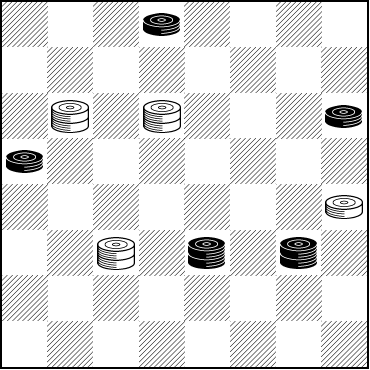
WHITE
White to Play and Draw
W:WK9,K10,20,K22:B2,12,13,K23,K24
If you're Black, you might be frustrated at the difficulty of hammering out a win. If you're White, and a man down but with a centralized position, you might be frustrated at the difficulty of hammering out a draw. Yet a draw is there. Work it out and then pound your mouse on Read More to see the solution.![]()
A Short Stroke for a Short Month

Leap Year won't come until next year, so February remains a short month. It's always seemed a bit unfair to us. Even though there are only 28 days, the rent or the mortgage or the condo fees remain at their full amount, as do the cell phone bill, the cable bill ...
We're certainly not going to solve that problem here, so maybe we'd best concentrate on a checker problem. It's a short stroke for a short month, and we think you'll find it to be on the easy side.
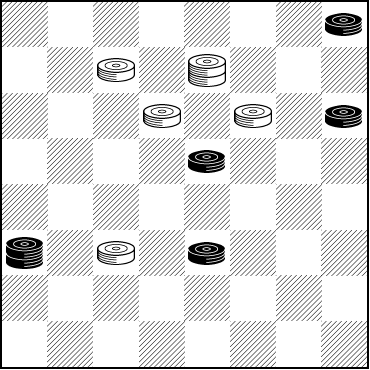
WHITE
White to Play and Win
W:W6,K7,10,11,22:B4,12,15,K21,23.
Can you solve this one in a short time? Figure it out and then make a short leap with your mouse onto Read More to verify your solution.![]()
A Fantasy

We found A Fantasy in an old checker publication, without any attribution. A Fantasy postulates a game between an Egyptian and the Wizard of Oz, played in the year 2,000 B.C.E.
Well, The Wizard of Oz wasn't published until 1900, but we're willing to suspend disbelief and overlook this nearly 4,000 year time gap, and we won't even get into the fact that our current form of checkers wasn't quite on the scene yet, either. We'll just start with the run-up to the problem position.
| 1. | 9-13 | 22-17 |
| 2. | 13x22 | 25x18 |
| 3. | 11-16 | 29-25 |
| 4. | 5-9 | 18-14 |
| 5. | 9x18 | 23x14 |
| 6. | 10x17 | 21x14 |
| 7. | 8-11 | 24-19 |
| 8. | 16x23 | 26x19 |
| 9. | 11-16 | 28-24 |
| 10. | 16x23 | 27x18 |
| 11. | 7-11 | 30-26 |
| 12. | 2-7 | 25-21 |
| 13. | 6-10 | 24-19 |
| 14. | 10x17 | 21x14 |
| 15. | 11-16 | 26-23 |
| 16. | 7-11 | ... |
Loses. An easy mistake to have made, but 7-10 would have drawn. We suspect Black didn't like the looks of 7-10 14x7 3x10 32-27 1-6 18-15 4-8 but Black is safe: ... 27-24 (31-26 10-14 26-22 14-18! 23-14 16-32 Black Wins) 16-20 31-27 12-16 19x3 10x26 to a draw.
| 16. | ... | 14-10 |
| 17. | 16-20 | 31-27 |
| 18. | 11-16 | 18-15 |
| 19. | 4-8 | ... |
Played 2,000 Years B.C.E.
BLACK (An Egyptian)
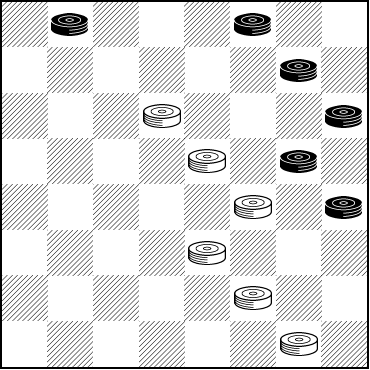
WHITE (The Wizard of Oz)
White to Play and Win
W:W10,15,19,23,27,32:B1,3,8,12,16,20.
Up until move 16, both our Egyptian friend and the Wizard played without error. But now the Wizard has a chance to win, and, being a Wizard, will naturally do just that.
Can you do as well as the Wizard of Oz, or is that thought just a fantasy? Stay in the realm of reality by solving the problem and then clicking on Read More to see the solution.![]()
For the Love of Thee
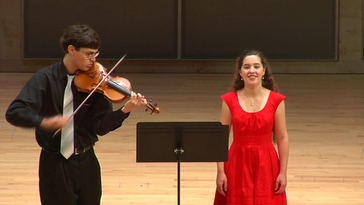
Fred C. Shardlow, born in New York around 1874 and subsequently a resident of the Marshall, Minnesota area, was a song composer, and is credited with the song, For the Love of Thee for voice and violin.
Mr. Shardlow was also a checker problem composer, and we feature one of his "Gem" problems in today's Checker School entry. Unfortunately we don't have further information about his checker career, although we did locate some other problems of his published in the American Checker Monthly and the Winnipeg Free Press.
So, for the Love of Checkers, take a look at the following position.
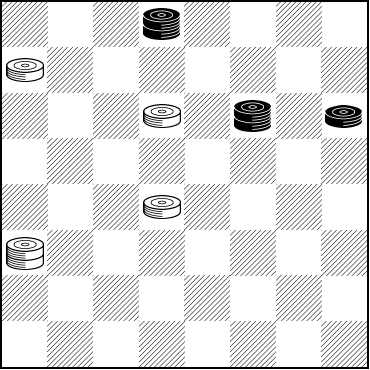
BLACK
Black to Play and Draw
B:WK12,15,23,28:B21,K22,K31.
We know you would love to solve it, so please do! And when you're done, you'll love to click your mouse on Read More to verify your solution.![]()
The Checker Maven is produced at editorial offices in Honolulu, Hawai`i, as a completely non-commercial public service from which no income is obtained or sought. Original material is Copyright © 2004-2025 Avi Gobbler Publishing. Other material is public domain, AI generated, as attributed, or licensed under CC1, CC2,CC3 or CC4. Information presented on this site is offered as-is, at no cost, and bears no express or implied warranty as to accuracy or usability. You agree that you use such information entirely at your own risk. No liabilities of any kind under any legal theory whatsoever are accepted. The Checker Maven is dedicated to the memory of Mr. Bob Newell, Sr.

